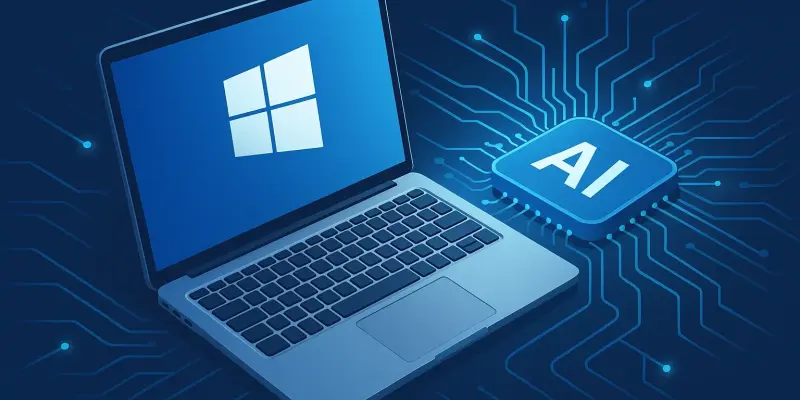The integration of artificial intelligence into Windows PCs is set to redefine computing as we know it. A standout moment that showcased this evolution occurred at Microsoft’s annual developer conference, where emphasis was placed on the revolutionary promise of AI-enhanced applications within the Windows ecosystem. One of the key innovations unveiled was the Copilot+ PC, equipped with a neural processing unit (NPU), enhancing both existing hardware capabilities and spurring developer creativity. This shift towards localized, edge-based computing presents a holistic new dimension, distinguishing the future of PCs as more intelligent and interactive platforms.
AI and Windows PCs: The Current Landscape
Market Trends and Adoption Rates
The adoption of AI in Windows PCs has been marked by significant momentum, reflecting broader industry patterns. Reports indicate a growing inclination toward AI integration, supported by data showcasing a steady upward trend in both demand and development. The market’s focus has shifted toward leveraging AI capabilities, particularly within PCs that now house NPUs to carry out sophisticated computations locally. This shift represents a democratization of technological advancements, chiefly through Windows ML and its robust application programming interface, which empowers developers to harness AI capabilities across different environments seamlessly.
Real-World Applications and Innovations
Real-world applications of AI in Windows PCs are vast and varied, revealing tangible benefits across industries. A notable example includes Adobe’s use of NPUs to enable the processing of large datasets within its video software. Such advancements highlight the potential of AI to transform traditional workflows, providing efficiency and precision. Companies at the forefront of innovation are demonstrating the sheer versatility of AI, with applications including smarter data analysis, enhanced productivity tools, and adaptive user experiences. As more industries recognize the potential of AI, the innovation landscape is expanding rapidly, driving demand for AI-savvy PCs.
Expert Insights and Industry Perspectives
Experts within the industry offer valuable perspectives on the integration of AI into Windows PCs. Thought leaders predict that AI capabilities, accentuated by advancements like the Copilot+ PC, will revolutionize how businesses strategize and operate. Industry pioneers emphasize that while the prospect of widespread AI adoption is promising, challenges such as data security and algorithmic transparency must be resolved to realize its full potential. Such insights underscore both the opportunity AI presents in enhancing Windows PCs and the need for vigilant development practices to address possible pitfalls effectively.
The Future of AI Integration in Windows PCs
Reflecting on the future, AI integration within Windows PCs is poised to usher in unprecedented levels of functionality and convenience. Planned developments indicate an increased focus on collaborative AI agents, tailored AI solutions, and expanded edge computing, making PCs more versatile. As businesses and sectors continue to adopt these technologies, the broader implications of AI reach beyond personal computing, influencing everything from enterprise operations to global communications. Although challenges like infrastructure adaptation and ethical considerations loom, the trajectory suggests a bright horizon teeming with possibilities and transformative potential.
Conclusion
AI integration within Windows PCs has redefined computing paradigms, threading innovation into the fabric of everyday use. By equipping PCs with powerful NPUs and advancing API functionalities, AI transformed processing capabilities and adaptability, bridging the gap between localized and global computing. As industries explore this transformative power, the focus on adaptive methodologies ensures that the evolution continues divergently from its origins. Observing these shifts encourages industry participants to consider enhancements while comprehensively addressing challenges that accompany swift technological progress. Moving forward, a thoughtful balance of innovation with precautionary measures remains crucial to realizing AI’s transformative potential fully.

